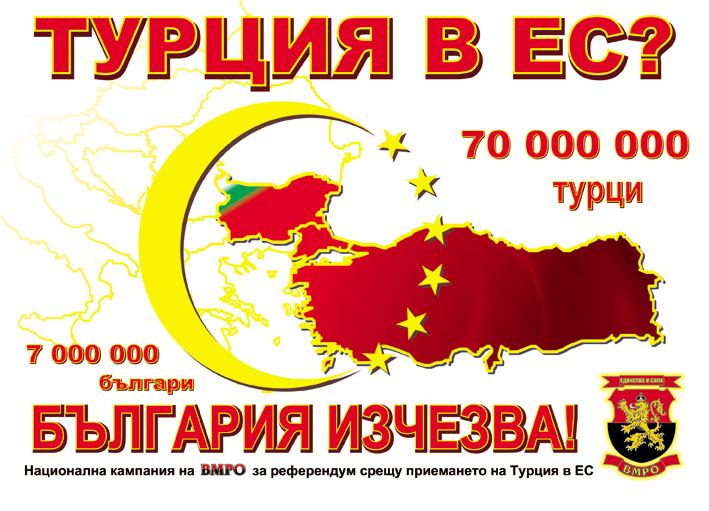Incitement of Hatred
 The agitation poster of the radical organization ВМРО - the Bulgarian National Movement - is against Turkey's accession to the EU.
The agitation poster of the radical organization ВМРО - the Bulgarian National Movement - is against Turkey's accession to the EU.
Most calls for ethnic hatred come from the extreme right party Ataka, the National Salvation Front, as well as a whole number of journalists, known for their xenophobic views. In general, these appeals are directed against three groups of the population: Roma, sexual minorities, and recently – against Syrian immigrants (see Section 2, 6 and 9).
In addition, on June 4, graffiti saying “death to Jews” and depicting swastikas were found on the announcement board at the Central Synagogue in Sofia.
In the 2000s, Bulgaria had a significant presence of ultra right-wing musical groups, however, currently have all been disbanded. Similar bands from abroad are also not touring in Bulgaria. Evidently, the interest in this kind of “cultural nationalism” is not high amongst Bulgarians. This niche is currently occupied by one M. Shamarov.
This cannot be said about radical nationalist literature. In recent years, books such as “My Struggle” (“Main Kampf”) by Adolf Hitler, works by Goebbels, as well as foreign and Bulgarian nationalists and Holocaust deniers, such as R. Harwood, A. Panaiotov, B. Stankov, etc., are enjoying increased popularity and are freely sold. There is a number of publishers of such literature. Most popular among them is the “Zhar Ptitsa” (“Firebird”), owned by Galin Yordanov.
With the onset of the coronavirus pandemic, the spread of hatred intensified, and it happened in Bulgaria not only online, but also in statements and even decisions of high-ranking leaders. The main victims, as usual, were the gypsies. If a year earlier, in January 2019, the Minister of Defense of the country, Krasimir Karakachanov, accused all Roma of being prone to crime, and the MEP from Bulgaria, Angel Jambaschi, generally repeated the same accusations, then with the onset of the pandemic, Roma were accused of being they are the main spreaders of the virus. At the same time, authorities at the municipal level, for example in Sofia, declared that all residents of the Roma quarters were sick with COVID-19. For example, on April 15, 2020, National Crisis Management officials announced a large number of infected people in the two Romani neighborhoods of Sofia Fakulteta and Filipovtsi. But the very next day it became clear that there were only 10 confirmed cases, while the total number of infected people in Sofia at that time was 486 people. Thus, despite the small number of confirmed cases of COVID-19 in Roma areas, the authorities decided to set up checkpoints only around these two blocks; however, the mayor of Sofia, Ms. Fandakova, stated that she did not see any discrimination in this. Thus, the ethnicization of the pandemic in Bulgaria has become a fact.


